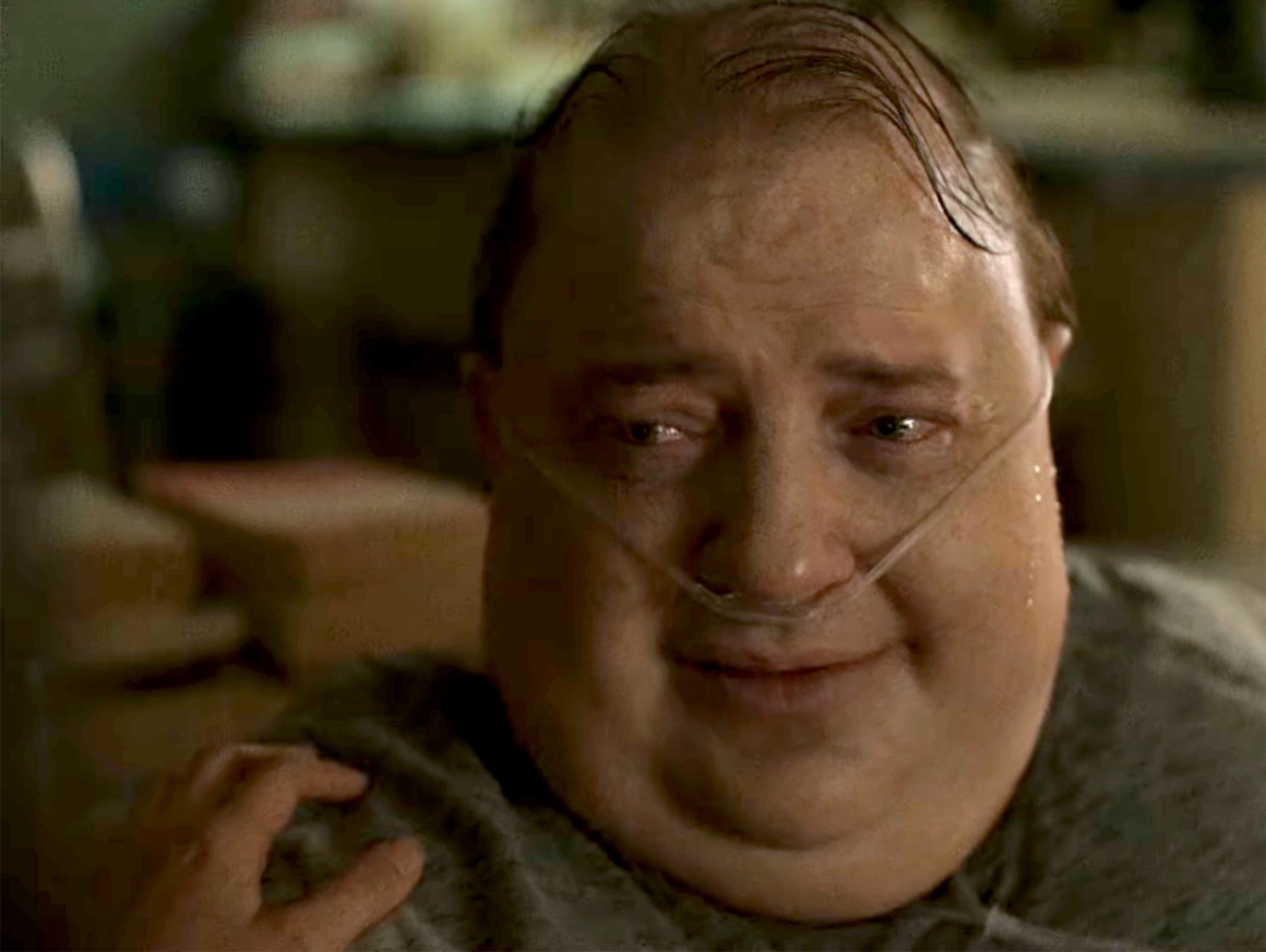TW – Pornography, Sex, Spoilers
Brendan Fraser’s long-awaited role in what could arguably be one of the best films of the year, “The Whale,” is finally here. Directed by Darren Aronofsky, this project has been ten years in the making, and the story was seemingly made to fit Fraser. In just two weeks at the box office, Aronofsky’s film has already surfed to the biggest limited opening of this year, beating a fellow A24 film, “Everything Everywhere All At Once.” The buzz for this movie initially began in August with its premiere at the Venice Film Festival. Now, audiences are embracing Fraser’s comeback role with waves of fervor.
One of the most compelling parts of this film is Aronofsky’s ability to make audiences uncomfortable, yet intrigued. ”The Whale” chronicles the last week of Charlie, portrayed by Fraser, who comes to find out he is dying from morbid obesity. Off the bat, the movie reels in the audience with a discomforting opening scene that shows pornography. The taboo moment is awkward but laced with curiosity for those wondering where this film could possibly lead. Viewers quickly learn that Charlie is a recluse who is unwilling to better his life. Every scene of the film’s 117-minute runtime transpires within the setting of his home.
The most obvious theme in this film is the motif of a whale, which leads to multiple tearjerking scenes throughout the movie. These include several scenes in which Charlie has a brush with death. Due to his various heart complications, too much stimulation, or even the occasional laugh causes him extreme chest pain. It is quickly revealed that reading and reciting a Moby Dick inspired essay (spoiler: a beautiful piece of writing that is later revealed to have been written by his daughter) about whales is what inspires him to persevere in these near-death moments. The essay, of course, alludes to the film’s title, but its introduction also provides a moment for viewers to take in Fraser’s prosthetics as he recites the lines and finally stands up to walk. Furthermore, it becomes a symbol of the strength he must find within himself as he seeks redemption before the end of his life.
In the exploration of his daily life, many scenes depict the struggle that Fraser’s character faces when performing mundane tasks at home. From masturbation that causes erratic chest pain to taking a shower — Charlie constantly suffers in his attempts to feel healthy and contented. One of the biggest metaphors in the film is the key that he drops on the floor. The struggle to retrieve the key from the ground seems impossible, but after several tries, he finally grabs it and moves on. The key resembles his struggle to reconnect with his daughter and salvage their relationship. As a reclusive man who abandoned his daughter, gaining her love proves to be an extremely difficult task.
Throughout the film, several characters move in and out of the scenes in the home. One of the most prominent characters is Charlie’s daughter, Ellie, who is portrayed by Sadie Sink. Their struggle for a father-daughter relationship is believable, and the chemistry between the two actors has you rooting for Ellie to forgive Charlie despite his grave mistakes. Fraser’s unlikely friendship with his caretaker, Liz, is shown to not be totally inconsequential, as the film reveals they both hold special places in each other’s hearts.
As the film unfolds, every character, line of dialogue and lighting choice contributes to this tragic piece of media. Fraser’s character holds somber eyes which complement the movie’s gloomy lighting. Every major character struggles with a profound sense of discontentment. Ellie’s anger towards the world or Liz’s anger towards God all point to the unresolved feelings each character holds.
The melancholic lighting scheme culminates in a blue-hued atmosphere that characterizes the depressive state of Charlie’s life. The dour tone of the film is accompanied by a musical score that feels helpless and low-spirited. As the film progresses, the music complements Fraser’s depiction of Charlie — the emotional depth of Fraser’s performance will inevitably pull on your heart strings. The film’s auditory ambience is built on a low-tuned score and the sounds of Charlie’s wheezing due to his gradually failing heart.
In certain scenes, the strife between Charlie and Ellie feels hopeless, and you’re not sure if you can feel bad for his character’s mistreatment despite his overweight condition. Though Ellie mistreats her father verbally, you still wonder whether he brought this animosity upon himself. Since he caused the havoc in his daughter’s life as an absent father, it leaves you doubting who is justified in this situation. Of course, Charlie’s final days alive are dedicated to making amends, but witnessing this strained relationship is disheartening and quickly makes you realize there really is no happy ending.
“This apartment smells. This notebook is retarded. I hate everyone.” The haiku ironically written by Ellie is one that Charlie appreciates. So much so, that it brings him physical joy and proves that even with her negativity and anger, he sees just how amazing his daughter is. In the end, Ellie proves to be Charlie’s sea during the final moment of his life when he attempts to “touch” the sea once more but instead embraces her. His last moments alive are transformative and beautiful, resulting in a scene that will have you crying a river.
After a rocky personal life, and setbacks in Fraser’s professional career, this film stands as a landmark for his new beginning in film. His ability to connect with his fans once more shows that audiences cannot wait to see what project he handles next. Fraser delivers an absolutely gut-wrenching performance, and since August, many have speculated that the actor is beginning his “Brenaissance” — a term for Fraser’s revived career. His role in “The Whale” tells a unique story that has been long anticipated and has grossed Oscar buzz over the past few months. Fraser and Aronofsky undoubtably prove that they make for an excellent creative team, and the product of their work together will leave you drowning in tears.

















